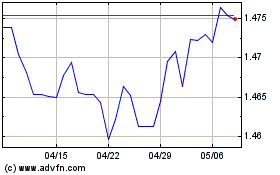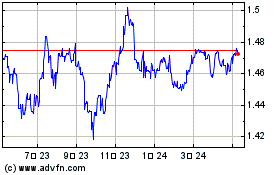Euro Declines After ECB Keeps Rates Steady
2018年4月26日 - 5:39PM
RTTF2
The euro drifted lower against its major counterparts in the
European session on Thursday, after the European Central Bank left
its key interest rates, asset purchases and forward guidance
unchanged.
The Governing Council, led by ECB President Mario Draghi, left
the key interest rates unchanged after the policy session in
Frankfurt, in line with economists' expectations.
The main refi rate is currently at a record low zero percent and
the deposit rate at -0.40 percent. The marginal lending facility
rate is 0.25 percent.
"The Governing Council expects the key ECB interest rates to
remain at their present levels for an extended period of time, and
well past the horizon of the net asset purchases," the ECB
reiterated.
The bank also confirmed that the net asset purchases, at the
current monthly pace of EUR 30 billion, will run until the end of
September 2018, or beyond, if necessary, and in any case until the
Governing Council sees a sustained adjustment in the path of
inflation consistent with its inflation aim.
Survey data from the market research group GfK showed that
German consumer sentiment is set to weaken in May due to rising
insecure state of geopolitics.
The consumer climate index dropped 0.1 point to 10.8 in May. The
score came in line with expectations.
The currency rose against its major rivals in the Asian session,
with the exception of the pound.
The euro dropped to 1.2154 against the greenback, its lowest
since January 12. At Wednesday's close, the pair was worth 1.2160.
The euro is poised to challenge support around the 1.19 mark.
The euro reversed from an early high of 133.26 against the yen,
falling to a 2-day low of 132.71. The pair was worth 133.07 when it
closed deals on Wednesday. The euro is seen challenging support
around the 131.00 area.
Having climbed to 0.8751 against the pound at 5:00 am ET, the
euro pulled back to hit a weekly low of 0.8709. At yesterday's
close, the pair was worth 0.8729. Next key support for the euro is
likely seen around the 0.86 level.
Data from the Confederation of British Industry showed that
British retailers expect retail sales volume to recover next
month.
The retail sales balance came in at -2 percent in April compared
to a healthier expectations of +16 percent.
The euro eased back to 1.1967 against the Swiss franc, from a
high of 1.1985 hit at 6:00 am ET. The euro is thus heading to
pierce a 2-day low of 1.1952 hit at 5:00 pm ET. If the euro
continues its decline, 1.18 is possibly seen as its next support
level.
The euro edged down to 1.7184 against the kiwi, after having
advanced to a 4-1/2-month high of 1.7257 at 2:45 am ET. The next
possible support for the euro is seen around the 1.70 area.
The 19-nation currency slipped to a 6-day low of 1.5604 against
the loonie and a 2-day low of 1.6057 against the aussie, coming off
from its early highs of 1.5655 and 1.6110,respectively. The euro is
likely to find support around 1.52 against the loonie and 1.58
against the aussie.
Looking ahead, U.S. weekly jobless claims for the week ended
April 21, durable goods orders and wholesale inventories for March
are due in the New York session.
Euro vs CAD (FX:EURCAD)
FXチャート
から 3 2024 まで 4 2024

Euro vs CAD (FX:EURCAD)
FXチャート
から 4 2023 まで 4 2024
